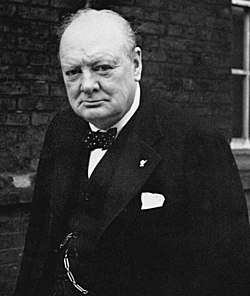The words we habitually use when we talk to others or talk to ourselves in our heads have a very powerful effect on our psychology. Understanding that and watching out for habitual patterns can transform our personal effectiveness.
Consider the following passage which I have adapted from a famous speech:-
"The British Empire and the French Republic, linked together in their cause and in their need, ought to defend to the death their native soil, perhaps aiding each other like good comrades to the utmost of their strength. Even though large tracts of Europe and many old and famous States have fallen or may fall into the grip of the Gestapo and all the odious apparatus of Nazi rule, we might not flag or fail. We really should go on to the end, we should fight in France, we should fight on the seas and oceans, we should fight with growing confidence and maybe even growing strength in the air, we should defend our Island, whatever the cost may be, we should fight on the beaches, we should fight on the landing grounds, we should fight in the fields and in the streets, we should fight in the hills; we might never surrender."
Contrast that with Winston Churchill's original:-
"The British Empire and the French Republic, linked together in their cause and in their need, will defend to the death their native soil, aiding each other like good comrades to the utmost of their strength. Even though large tracts of Europe and many old and famous States have fallen or may fall into the grip of the Gestapo and all the odious apparatus of Nazi rule, we shall not flag or fail. We shall go on to the end, we shall fight in France, we shall fight on the seas and oceans, we shall fight with growing confidence and growing strength in the air, we shall defend our Island, whatever the cost may be, we shall fight on the beaches, we shall fight on the landing grounds, we shall fight in the fields and in the streets, we shall fight in the hills; we shall never surrender."
Do you think that the first one would have inspired the nation and gone down as one of the greatest motivational speeches in history? Maybe what I have done seems a little silly, but the first passage is how many of us habitually speak, both to ourselves and to the people around us.
"I ought to do some exercise."
"I might spend more quality time with my kids."
"I am unhappy in my marriage, I should do something to change it."
When we use words like 'ought' and 'should' we are allowing ourselves a psychological escape. These phrases are often followed by 'but ....' and end up being excuses why you are actually not going to do the things. We are torturing ourselves by continually holding up the things which bring dissatisfaction in our lives, but not committing to do something about them.
Things never get done until you apply will power. By that I do not mean some untenable feeling of strong determination, but simply habitually using the word 'will' (or in Churchill's case 'shall') when we talk to ourselves and others.
"I WILL do some exercise."
"I WILL spend more quality time with my kids."
"I am unhappy in my marriage, I WILL do something to change it."
When we use the word 'will', it is far more strong and certain and there is no room for excuses. It is even better if we get more specific about it.
"I WILL do 30 minutes exercise 5 days a week starting tomorrow."
"I WILL set aside an extra hour every day to concentrate solely on playing with my kids and I WILL exclude everything else during that hour."
"I am unhappy in my marriage, I WILL speak with my wife about it this evening at 7 pm."
Many people do not realise that will power is just simply a matter of changing our habitual language patterns. People often say things such as 'that man has very strong will-power but that other fellow is weak-willed'. The point is that we all have very strong will power if we choose to use it. All we have to do is make the effort to root out indecisive language and replace it with the power that habitual use the word 'will' instantly brings.







No comments:
Post a Comment